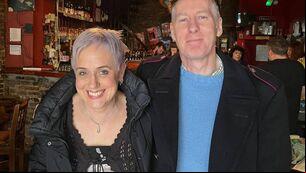Author Tina Pritchard on her Cork links: ‘I loved being in Ireland ...I felt very accepted’

Novelist Tina Pritchard was keen to get in touch with The Echo as the paper features in her latest novel, The Sea Glass Beach.
Novelist Tina Pritchard was keen to get in touch with The Echo as the paper features in her latest novel, The Sea Glass Beach.
Corkonians will no doubt react to the familiarity of the scene depicted on page 44 of the novel.
It reads: “The Post Office was quiet and they were in and out in no time. On emerging they were treated to a loud ‘Echoooo’ from the local newspaper seller. It made them both jump, then dissolve into giggles as he gave a cheeky wink in their direction.” The story, a coming of age narrative about a young, free-spirited girl who is sent by her mother to Canada to avoid the strictness of Catholic society in 1950s Ireland, is very close to her own.
“My family was from Sunday’s Well and I was born in Sean Ross Abbey to a single mother in the 1950’s. My mother was in fact in the home at the same time as Philomena, although I don't believe they knew one another. I was set to be adopted like many of the babies and children there. Instead I returned home with my mother and lived in the family home until she got work in the UK and sent for me when I was aged three.”
During that time Tina, given the name Martina by the nuns in the home, was raised by her grandmother.
The writer, now very settled in England, re feeling very loved by her sole guardian.
“I was always impeccably dressed in beautiful coats and boots. I’m sure there was some dissent from neighbours at the time, my mother having been a single woman, but my grandmother never allowed for it to affect us. I loved being in Ireland, and when I’d return for holidays in the summer and at Christmas I always felt very accepted. I nothing negative at all. My grandmother ended up living with her sister in Friar’s Walk. I also lived in Cork for a while and worked in the Intercontinental Hotel on the Western Road. I have very clear memories of Cork at that time.”
When Tina made her way to her mother at the age of three she met her new stepfather, a Coldstream Guard whose duties included guarding the Queen at Windsor Castle.
“My mother never spoke about what had happened to her in Ireland even though we still visited regularly and your paper featured in our household throughout my childhood as my mother had it sent over to her on a regular basis.”
She reflects on the impact of their separation for those first few years.
“She and my stepfather had a son and I suppose the only negative was that I never fully felt a part of the family.
Tina worked from memory in depicting the lives of the characters in Cork in the opening chapters of the book.
“I also did a google walk, just to check that I was getting it right. But a lot of the detail is from my own somewhat distant memory, like the scene of Róisín leaving Ireland from Cobh. All of that, I from taking the train there as a child.”
The characters are sometimes drawn from her own life, and sometimes not.
“The mother in the novel is not my mother, although she also has a child out of wedlock and changes her mind about giving her up for adoption. Still, Theresa is very different. When young Róisín arrives in Nova Scotia, she is looked after by an Aunt Peggy. In certain ways, she is very much my nana. And maybe Róisín is a little bit like me – she is a bit wild and free-spirited and enjoys the freedom of running barefoot in Nova Scotia. I also love that part of the world and have visited it many times.”
The novel sheds an unfavourable light on the Catholic church in Ireland at the time but Tina is not interested in knocking anyone. She is simply telling a story.
"The first person to review the book as part of a blog tour was a Christian reader and I was worried how they would react but they gave it a very positive review which was wonderful.”
The book is dedicated to the mothers and children who were part of the adoption scandal associated with the Irish mother and baby homes and Magdalene laundries. That is enough, she feels. Although there is certainly criticism of society at the time in the details of Róisín’s story.
“Theresa is called into the principal as Róisín is challenging everything and everyone. She is a gifted and intuitive child and Theresa realises she will soon be crushed by the strict nuns, and so she sends her off to Canada in an act of love. She fears the nuns would like to put Róisín working in the laundry and there is no way she will let that happen.”
This novel, a work of fiction drawn from experience, is a departure from the writer’s last offering.
“In 2021, after a long career and approaching retirement, I had my first book, a psychological thriller called In A Deep Dark Wood published. I don’t write for money, I write for me. So I don’t need to churn out lots of books in the same genre. The book I’m working on now is a return to the psychological thriller genre but I might switch again next time round.”
The storyteller is thoroughly enjoying sharing her books with others and is giving talks to plenty of women’s institutes in the UK. The reception to The Sea Glass Beach has been very positive.
“There are pretty big themes in the book, including love, loss and sexuality. The young protagonist encounters trauma and devastating loss but also gains a new family and finds love with the enigmatic Cal. It started as a short story which I was writing for a competition. When I missed the deadline I decided to stick with it and write some more.
The Sea Glass Beach is available to order here: https://www.amazon.co.uk/dp/B0BMJR3ZT3







 App?
App?


